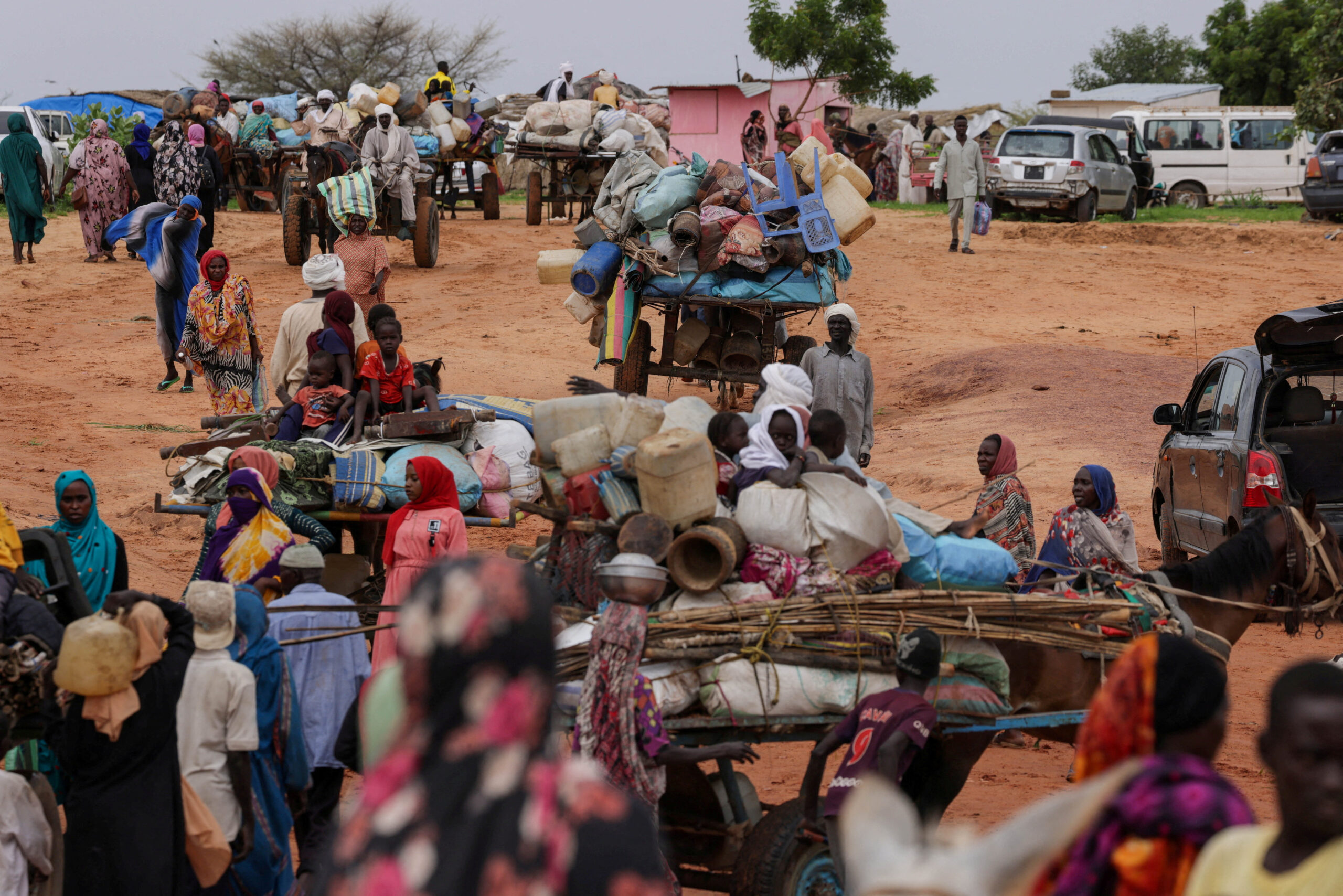By Hager Eissa (WLC member)
Sudan faces a growing risk of genocide as global attention is diverted elsewhere, civilians are being targeted based on ethnicity amid intensified fighting.
Sudan is currently experiencing the world’s largest displacement crisis, with nearly 9 million people forced to flee their homes to other parts of the country or neighboring nations. The majority of the population now lacks access to health care, and an entire generation of children is missing out on education due to the ongoing conflict and instability.
Since mid-April 2023, over 8.8 million people have fled their homes in Sudan. Internally displaced persons (IDPs) urgently need food, followed by healthcare, water, and sanitation services, especially in the Darfur and Kordofan regions. Rising hunger and severe malnutrition are expected to cause increased hunger-related deaths in the coming months. Since the conflict began on April 15, 2023, the Armed Conflict Location & Event Data Project (ACLED) has recorded 15,550 fatalities and over 1,400 violent incidents targeting civilians. In March and April, around 860,000 people in Kordofan, Darfur, and Khartoum did not receive humanitarian aid due to ongoing violence and bureaucratic obstacles.
Sudan’s war did not begin out of vade, there are many countries involved in this conflict including UAE, The United Arab Emirates (UAE) is facing criticism for its support of the Rapid Support Forces (RSF) in Sudan’s civil war, which observers say is exacerbating the conflict. The UAE’s backing of RSF leader Gen. Mohamed Hamdan “Hemedti” Dagalo has been crucial to the RSF’s successes, including their recent capture of Wad Madani. This support has led to strained relations with Sudan’s military, resulting in the expulsion of UAE diplomats. The UAE’s involvement includes supplying weapons, logistics, and financial support, and maintaining close ties through gold smuggling operations. Critics argue that the UAE’s actions are destabilizing Sudan and empowering violent non-state actors, undermining efforts for peace. The international community’s failure to engage external backers like the UAE is seen as a significant barrier to resolving the conflict.
Additionally, the Genocide survivors in Darfur are now caught in another brutal conflict: In Darfur, Child malnutrition in Sudan is at a crisis level, especially in Central Darfur and ZamZam camp, where nearly 30% of children under five are severely malnourished. The ongoing conflict and lack of humanitarian access worsen the situation. Malnourished children are at a higher risk of death and long-term health issues, and pregnant and breastfeeding mothers are also severely affected, risking the health of the next generation. The conflict has left families without food, medical support, and shelter. Humanitarian agencies are calling for immediate access to help those in need and prevent the situation from becoming the world’s largest hunger emergency. The upcoming rainy and lean seasons will further exacerbate the crisis. Immediate and sustained aid and a ceasefire are urgently needed to save lives.
El Fasher, one of Darfur’s largest cities, is currently a battleground in the year-long war between Sudan’s army and the paramilitary Rapid Support Forces (RSF). This conflict has displaced nine million people and pushed many to the brink of famine. The situation in El Fasher is dire, with UN officials describing it as “Hell on Earth” and warning of potential genocide. The battle for control of El Fasher, the army’s last stronghold in Darfur, has led to intense fighting and civilian suffering, especially as the RSF imposes a brutal siege. With limited international aid, local youth groups and emergency responders are the city’s main hope, often risking their lives to provide assistance.
Call to Action
Urgent Call to Action: Prevent Genocide and Alleviate the Humanitarian Crisis in Sudan
- Sudan is facing an imminent threat of genocide, with civilians being targeted based on ethnicity amid escalating conflict. As global attention is diverted elsewhere, nearly 9 million Sudanese have been displaced, many without access to essential healthcare and education.
Your Immediate Action is Crucial:
- Deliver Emergency Aid: Internally displaced persons urgently require food, healthcare, water, and sanitation services, especially in the Darfur and Kordofan regions. Rising hunger and severe malnutrition threaten countless lives.
- Facilitate Humanitarian Access: Ongoing violence and bureaucratic obstacles have prevented aid from reaching 860,000 people in critical regions. We must advocate for safe and unhindered humanitarian access.
- Hold External Actors Accountable: The UAE’s support for armed groups is exacerbating the conflict. The international community must apply pressure to external backers to encourage a peaceful resolution.
- Support Malnourished Children: Child malnutrition is at crisis levels in Central Darfur and ZamZam camp, with nearly 30% of children under five severely malnourished. Immediate nutritional and medical support is essential to save lives and protect future generations.
- Promote Ceasefire and Peace Efforts: Advocate for a ceasefire and support peace negotiations to end hostilities and suffering.
Why Your Involvement Matters:
● Prevent Genocide: Genocide survivors in Darfur are facing renewed threats. Immediate intervention can prevent history from repeating itself.
● Save Lives: The upcoming rainy and lean seasons will exacerbate the crisis. Sustained aid can prevent Sudan from experiencing the world’s largest hunger emergency.
● Support Local Heroes: Local youth groups and emergency responders are risking their lives to provide aid. Your support amplifies their heroic efforts.
How You Can Help:
● Donate: Contribute to reputable humanitarian organizations providing relief in Sudan.
● Advocate: Contact your government representatives to push for increased international aid and
diplomatic pressure to resolve the crisis.
● Raise Awareness: Share information about the crisis in Sudan on social media and within your
community to garner more support.
